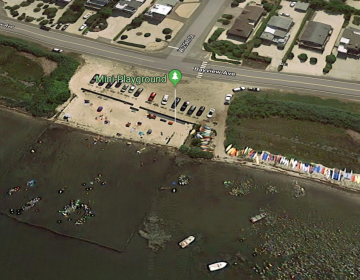Officials: Avoid contact with Manasquan Reservoir due to ‘harmful’ algal bloom
Tests revealing high levels of a harmful algal-like bacteria have prompted state and county officials to warn the public to avoid all contact with the Manasquan Reservoir.

(Google Maps)
Tests revealing high levels of harmful algal-like bacteria have prompted state and county officials Wednesday to warn the public to avoid all contact with the Manasquan Reservoir.
The bacteria, known as “cyanobacteria” or blue-green algae, can cause an adverse reaction in humans and pets.
“Cyanobacteria frequently impart off‐tastes and odors to the water in which they grow, and sometimes they produce toxins that can be harmful to the health of humans and other animals,” a New Jersey Department of Environmental Protection fact sheet states. “Although problems related to cyanobacteria most often occur in freshwaters (lakes and streams), cyanobacteria can also be found in marine waters.”
In addition to not eating fish caught in the 770-acre waterbody in Monmouth County’s Howell Township, pets should not drink the water, and all should avoid direct contact.
Anyone who swims in the water could experience gastroenteritis, skin irritation and allergic responses, according to the Centers for Disease Control and Prevention.
The New Jersey Sierra Club says these types of blooms “are formed from bacteria carried in by nutrients primarily from septics and lawn and garden fertilizer.”
Jeff Tittel, New Jersey Sierra Club’s director, says it’s “been the summer of blue green algae and closed lake advisories,” citing problems at numerous New Jersey lakes, including Lake Hopatcong, Greenwood Lake, and Lake Musconetcong.
WHYY is your source for fact-based, in-depth journalism and information. As a nonprofit organization, we rely on financial support from readers like you. Please give today.




